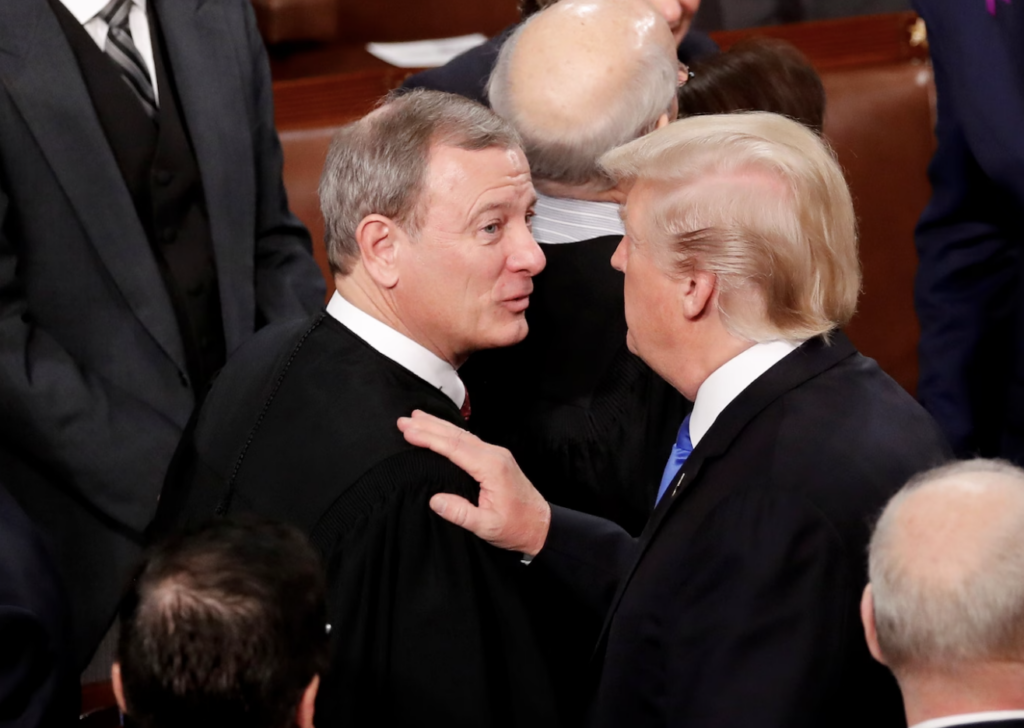The Supreme Court and Trump v. The United States

There have been some good deep dives into the total degeneracy of the Supreme Court published recently, but before we get to that I strongly recommend Radley Balko’s post on what may well be the lowest point in the dismal history of the Roberts Court:
The Supreme Court’s ruling in Trump v. United States is its worst decision of my lifetime. John Roberts’s sloppy, arrogant, contradictory majority opinion provides license for any future president to lie, cheat, steal, suppress dissent, and — if they have the stomach for it — assassinate. It obliterates a guardrail for executive power that’s fundamental to a functioning democracy. So fundamental, in fact, that until the country elected an aspiring autocrat brazen enough to engage in open-air corruption, it was a guardrail few thought necessary to actually define. Of course the president can be prosecuted for actual crimes.
When Trump initially made his claim of “absolute immunity” for presidents from criminal charges, it was widely derided among constitutional scholars as a hopeless Hail Mary. Then John Roberts answered Trump’s prayers.
This opinion isn’t a stain on Roberts’s legacy. It is his legacy. He will be remembered as the “institutionalist” who destroyed the legitimacy of the institution entrusted to his care. And if that’s the worst of the damage, we’ll all be lucky.
“,,,the judgment this day rendered will, in time, prove to be quite as pernicious as the decision made by this tribunal in the Dred Scott Case,” as the first Justice Harlan observed about another cases toward the top of the Court’s extensive anticanon.
The rest of Balko’s analysis is also first-rate, but since it’s his speciality I wanted to highlight the incredibly selective, elitist, and partisan concern crocodile tears about prosecutorial overreach being cried by notably anti-civil-libertarian justices like Alito and Roberts:
Alito again:
“I mean, most of the –the vast majority of attorneys general and Justice Department attorneys –and we both served in the Justice Department for a long time –are honorable people and they take their professional ethical responsibilities seriously, but there have been exceptions, right, both among attorneys general and among federal prosecutors?”
I suppose it’s nice that these justices are suddenly concerned with potential abuse, and think it’s a mistake to rely on the good faith of prosecutors. But let’s be real here. These same justices have been steadily eroding federal review of state convictions, including cases tainted by prosecutor misconduct. This concern for unethical prosecutors extends only to prosecutors pursuing wealthy people, politicians, or in this case, whoever happens to be occupying the most powerful office on earth.
Here’s Roberts again:
“We do not ordinarily decline to decide significant constitutional questions based on the Government’s promises of good faith.”
This is patently, laughably false. The Supreme Court has created “good faith” exceptions to the Exclusionary Rule that allows the state to use evidence from illegal searches if police promise they thought they were following the law. The court relies on the good faith of government officials when they invoke the State Secrets doctrine to prevent criminal defendants or litigants against the government from obtaining evidence that could help their cases, despite many examples in which we later discovered that the government only invoked the doctrine to cover up misconduct — including in the case that established the State Secrets doctrine. When police or prosecutors tell courts that potentially exculpatory evidence was lost or accidentally destroyed, the Supreme Court assumes those officials are telling the truth, putting the burden on criminal defendants to show otherwise. (The case that established that precedent turned out to be a wrongful conviction).
And finally, while the court has generally ruled that prosecutors must turn over exculpatory evidence under Brady v. Maryland, it has not required them to turn over their entire case files, which means that the court puts its faith in prosecutors to determine what is and isn’t exculpatory. When prosecutors have been shown to have deliberately withheld exculpatory material — even material that has led to exonerations — the court has protected those prosecutors from civil liability through the doctrine of absolute immunity, a doctrine which, like presidential immunity, is not in the Constitution, and which the court invented from whole cloth.
Plenty of more good stuff where this came from — including about the Court’s always-embarrassing law office history — and I recommend it all.


